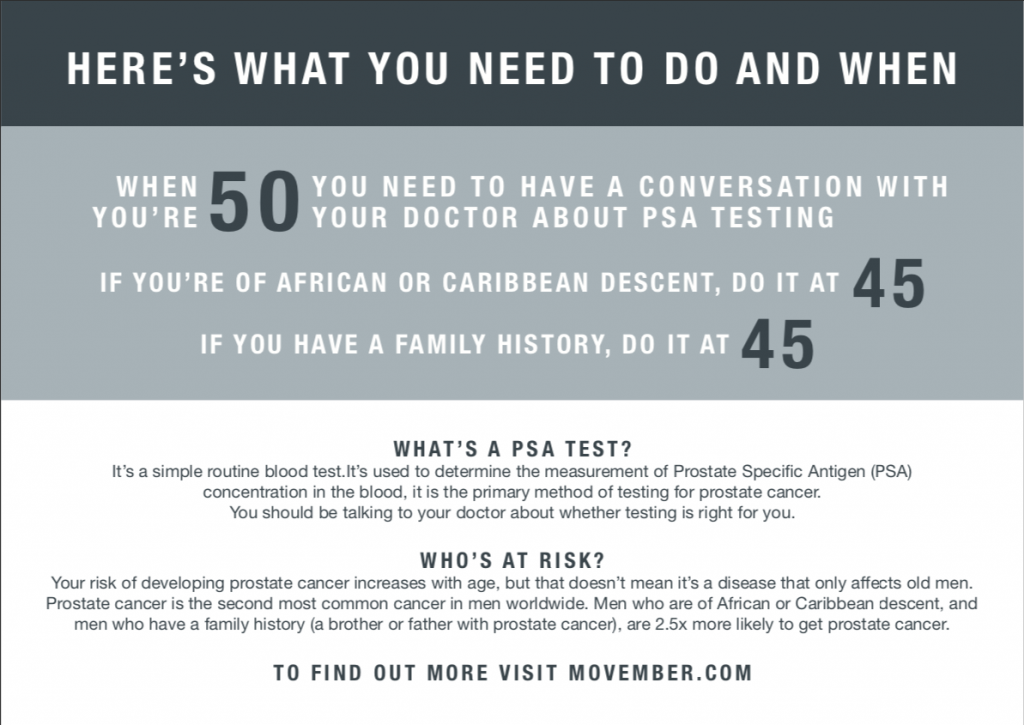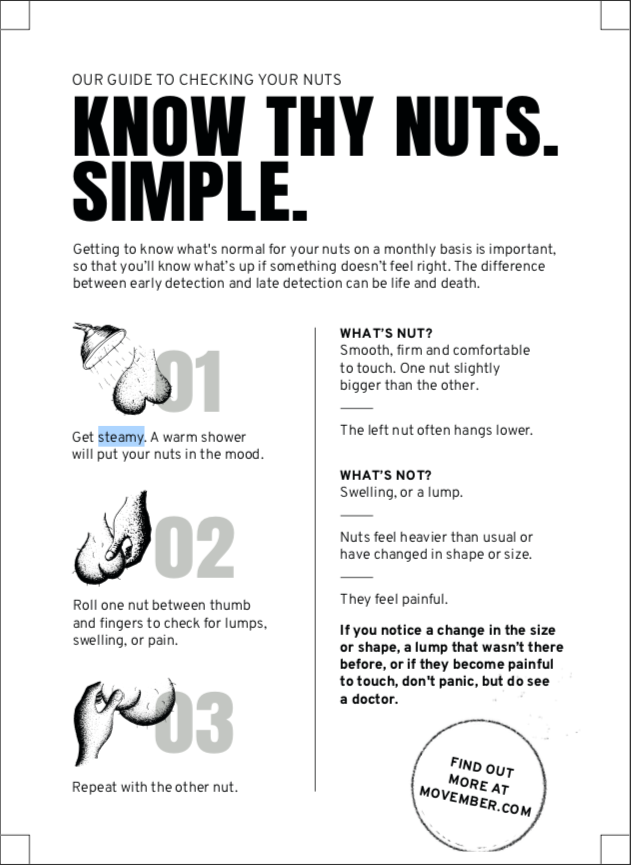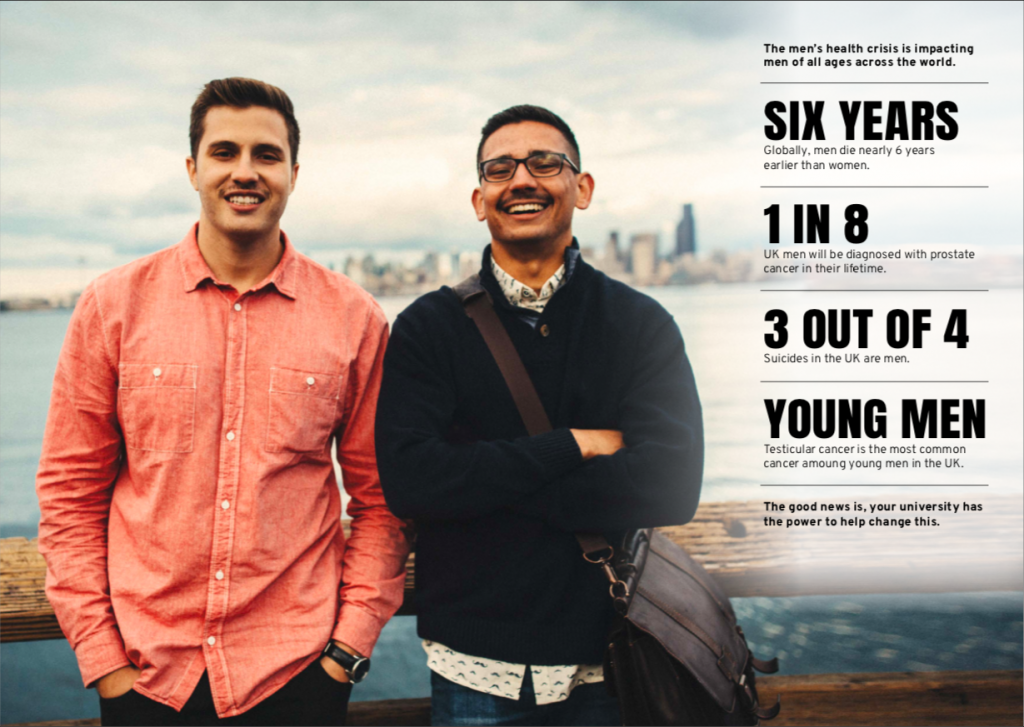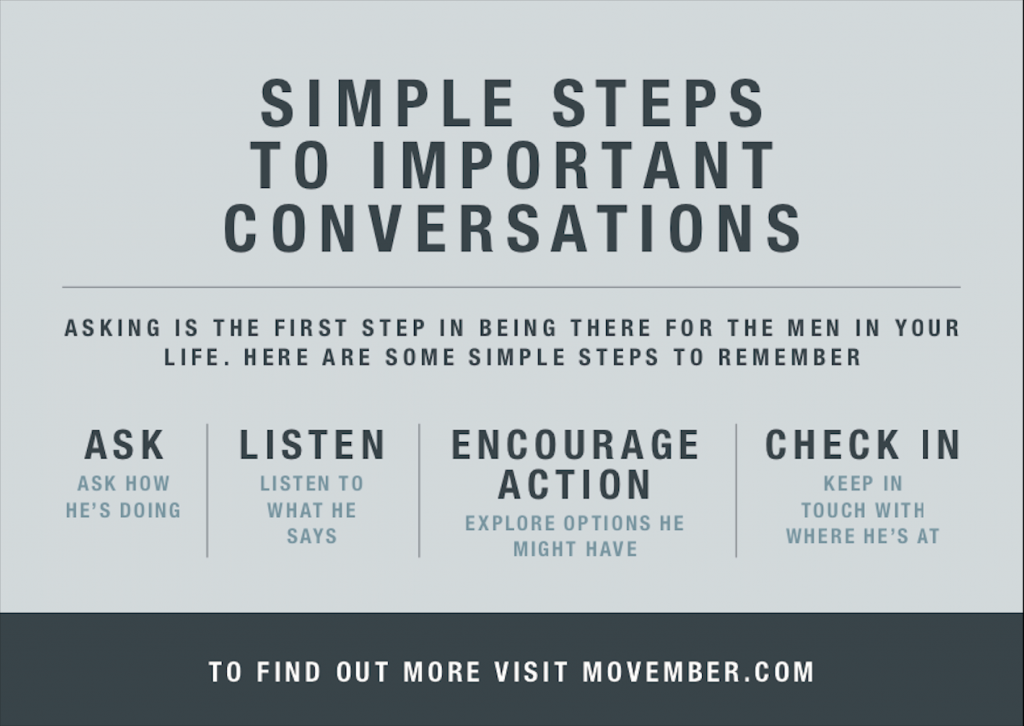Movember is an Australian charity set up in 2003 which aims to raise awareness on testicular and prostate cancers, as well as men’s mental health. Tom Abadie looks at the work they have been doing as well as the various issues men encounter throughout their lifetime.
Movember is an Australian charity set up in 2003. At the time, they had 30 Mo Bros (participants to the cause), and now they have over 6 million. They raised £21,000 in their first year and now fund over 1,250 men’s health projects. They now have Mo Bros around the globe and help out in health projects in over 20 countries, including the UK.
It is a simple project where men bring the moustache back into fashion and showcase it to their friends, family and colleagues. The aim is to raise awareness on the many issues that men face throughout their lifetime; while it started mostly as a physical health project, revolving around testicular and prostate cancers, it has since moved into the field of mental health as well. We are going to look into these issues and how Movember is helping tackle them.
First of all, from a physical health point of view, Movember addresses the issues of testicular and prostate cancers. If left unchecked, prostate cancers will double in the next 15 years. It is the second leading cancer death in the USA, just behind lung cancer. Globally, testicular cancer is the most common cancer for men between 15 and 39 years old. Even though the latter can be treated, both cancer treatments have serious secondary effects, particularly on mental health.
What can be done? Firstly, the money raised during the month of November is given to the health projects as well as for researching cures and helping men get through these treatments in a better situation than they are currently, but most importantly prevent deaths. Secondly, by raising awareness, Movember changes mentalities and encourages men and people around them to keep an eye out for possible cancers and health issues. By checking, you can prevent the spread of cancer, and saves lives.

If prostate cancer is detected early, you have a 98% chance of living past 5 years. If it’s a late detection, that number drops to 26%. What can be done to avoid this? When you are 50 years old, speak to your doctor about the Prostate Specific Antigen (PSA) Testing; if you are black, Caribbean or have a history of prostate cancer in your family, it is instead recommended the test to be done at 45, as you are 2.5 times more likely to have prostate cancer. You might think that you are healthy and that everything will be fine, but 1 in 8 men get this cancer in their lifetime.
Testicular cancer is common amongst young men as mentioned above. To avoid its enormous consequences, it is recommended for you to regularly self-assess your situation down there. Unfortunately, 44% of men don’t know how to do this assessment, but you can watch this helpful video here. Although science has evolved, and the worst a treatment can lead to is the removal of one testicle (which should not adversely affect your sex life or fertility), it is definitely something we would all prefer to avoid.

Men are overall, physically, considered to be the healthier of the two genders. Despite the assumption that men are strong, physically fit and healthy, they, in fact, have a lifespan six years shorter than women. This is due to cancers and the lack of communication around them, as well as higher rates of suicide. Breast cancer and heart diseases are widely talked about nowadays, especially for women, but not so much on the men’s side. By not being careful, men do not take the appropriate steps to prevent these cancers from spreading.
Another big problem that men face, is the lack of discussion around mental health. Some of the side effects of the treatments for these cancers have a huge impact on one’s mental health, so it is all linked together. The terrifying statistic is that 3 in 4 suicides are men. So what are the many reasons behind this?
We can start with what it means to be a man in today’s society. Role models are usually tall, fit and muscular actors or sportsmen, who are incredibly powerful and stable. These role models are plastered on magazine covers with their incredible bodies, destroy buildings with their sheer strength in movies or accomplish superhuman processes on a daily basis (in the eyes of the media at least). Growing up as a teenager, you look at Cristiano Ronaldo or Ryan Reynolds and you would think that it’s what you are supposed to become: this machine, built of muscles, that can achieve anything in life without a scar and be mentally driven to perfection.

However, the reality is different. Young men are all built differently, coming from different ethnic and socioeconomic backgrounds, and ultimately cannot all have the same drive as their role models. More importantly, these role models appear significantly different to what they actually are. Mental health in sports and cinema for example is barely talked about, but there is a growing consensus throughout these industries that everyone is far from perfect. This is the side the media and magazine covers do not show: their weaknesses, their humanity and their entirely normal imperfections.
With this false education and unhealthy drive for perfection, it is difficult for young men to accept that they aren’t doing too well, that there might be faults in the masculinity stereotype that men have to conform to. This perfectly shaped man, with his head on his shoulders day and night, with a certain sense of perfect stability in everything he does; these people do not exist. No, real men go through difficult times in their lives; times where they doubt themselves, their choices, their lives. Times where you might not feel great in your body, times where you aren’t happy in your relationship, times where your work or studies are too hard or don’t excite you as much as they used to.
Unfortunately, when these times come around, it is hard to talk about it with others, especially other men. “70% of men say their friends can rely on them for support, but only 48% say that they rely on their friends. In other words: we’re here for our mates but worried about asking for help for ourselves. Reaching out is crucial.” As the Movember website puts it perfectly, being in a group of ‘lads’ means you most likely will not express what you are going through.
70% of men say their friends can rely on them for support, but only 48% say that they rely on their friends. In other words: we’re here for our mates, but worried about asking for help for ourselves. Reaching out is crucial.
You are scared of the judgment of others, they might say “man-up chap!” or “grow up bro!” and you’ll convince yourself that you’re actually fine and that everything will go away with time and without thinking about it too much. It often doesn’t, instead, it eventually becomes bigger and too much to handle. A small problem can be dealt with to a certain extent, but the snowball effect can unfortunately lead to more and more suicides.
How do we prevent that? Firstly, general society should try to deconstruct the ‘strong masculine figure’ archetype and focus on what men really are in 2020. They are human, who can have their problems with their family, friends or work, and ultimately suffer from a lot of issues in everyday life.
Secondly, from an individual point of view, you can follow the advice offered by the Movember website. You can start by surrounding yourself with people you trust, with whom you are comfortable with, and also make you happy. Be active, move around, try to be more careful with your physical and mental health as this will keep you in better shape, which is essential to tackling mental health problems and makes you stronger to fight off diseases and cancers. You will ultimately live a longer and happier life.
If you are ever in a situation of need, do not hesitate to talk. It is never easy to start the conversation with someone about these topics, whatever gender you are, but they are essential to your wellbeing.

If you feel that someone around you is in that situation of need or is just not quite himself, you can either direct him to campus resources, or you can from a personal standpoint help that person by applying certain techniques. Movember has many resources and training to train yourself to help others around you. One of the main approaches is A.L.E.C.:
- Ask: “You haven’t seemed yourself lately – are you Okay?” is one of many good options to start with
- Listen: Give the person attention, listen to the answer, ask more questions such as “How long have you felt this way?”
- Encourage action: Suggest things that might help such as sleeping more. Alternatively, push that person to share more with you or with other people he trusts or to consider counselling, even for one session
- Check-in: follow up on this conversation at a later date, see if things have evolved and help that person continue pushing for a better wellbeing
Ultimately, 2020 has been a difficult year for everyone, wherever you are in the world. For students, it has drastically changed the way we receive education, with the move to online classes and life on zoom. This pandemic has changed the way we view the world, the things we take for granted such as travelling and especially socialising. Being isolated can lead to anxiety, stress and a general feeling of loneliness.
We talked with the VP Welfare, Vinnosh Kumar, who told us more generally about mental health and more specifically men’s mental health. He thinks “lots of students fail to recognise that their way of living can be detrimental to their mental, emotional and physical health” and with current society, we are normalising this pressure on every-day life. To counter this, and avoid further issues, “students need to set aside time to understand that it is okay not to be okay”, and take care of themselves. The SU, through its SU Advice and SWIS teams, are committed to “to ensure that we are here for our students”, as they do their best to support students and help them with their wellbeing. He added, “Students are STRONGLY advised to use these services if they feel that they are struggling.”
Additionally, he talked about the pressure of being a man, and from his personal experience what it is like being an LGBTQ+ and Malaysian man. He addressed the issue of not talking between men, how society wants us to stay quiet and not discuss our issues, particularly with other men. There is a general lack of understanding of how deep the views and opinions of peers can affect an individual. This mainly concerns conversations around sexuality, race and how to get through many stages of life. There is a real struggle to open up for men and this is mainly due to “toxic masculinity always directed male peers to reject any notion of vulnerability amongst other men”. Vinnosh hopes that Movember can “reach out to more men and help them to disassemble pre-conceived and illogical understanding of what it means to be a man”. This will help men open up about their daily struggles, avoid further suicides and generally help men get through life in a healthier way. Men are individuals, who can be fragile, and do not follow outdated standards of masculinity and ‘manly-hood’ as you might hear in these kinds of conversations.
With charities like Movember and a general better understanding of mental health for men and women, we can move together towards a brighter future after this pandemic. Crucially, this month with Movember, stay in touch with others during the lockdown, stay positive, and be careful of your wellbeing and other’s mental health to the best of your ability. Help as much as you can, guide somebody to the relevant people that can help, but never forget to make time for yourself, to love yourself and to take care of your own mental health. You are all amazing people, but it’s important to remind yourself that once in a while. So check out the relevant resources, support the charity and get help if you are in need of support or guidance. Finally, it’s okay to not be okay. You are not alone.